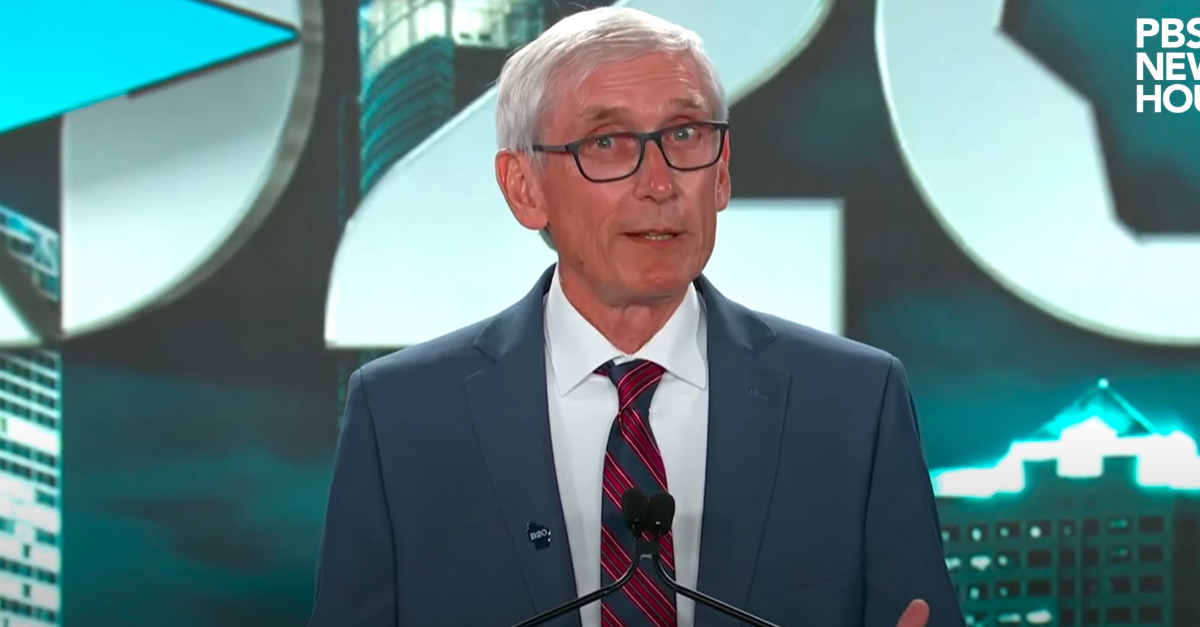
Gov. Evers
A Wisconsin state judge refused on Monday to terminate Democratic Gov. Tony Evers’s mask-wearing mandate. Polk County Circuit Court Judge Michael Waterman said that plaintiffs Derek Lindoo, John Kraft, and Brandon Widiker were simply not entitled to relief.
The plaintiffs argued that Evers—in issuing successive states of emergency executive orders seemingly without an end to shutdowns in mind— exceeded his legal authority by, among other things, requiring citizens to wear masks amid the coronavirus pandemic. At a minimum, the plaintiffs sought a temporary injunction to block Evers’s orders while the case played out in court; at most, they sought the termination of Executive Order 90.
Judge Waterman gave them neither because it was not clear that the plaintiffs had a right to the relief they sought.
“Although the plaintiffs agree that COVID-19 constitutes a public health emergency, they believe that the governor may not issue successive executive orders for the same emergency without violating the 60-day limit of section 323.10. To reach that conclusion, the governor argues, one must deviate from the language of the statute and find meaning that is not expressed by the text,” the judge said. “The Court agrees.”
“Nothing in the statute prohibits the governor from declaring successive states of emergency. Instead, the statute allows a declaration ‘if the governor determines that a public health emergency exists,'” he added. “That language gives the governor broad discretion to act whenever conditions in the state constitute a public health emergency. Although ‘the governor cannot rely on emergency powers indefinitely,’ Wisconsin Legislature v. Palm, 2020 WI 42, ¶ 41, 391 Wis. 2d 497, 942 N.W.2d 900, he can when a public health emergency exists and the legislature lets him do it.”
Judge Waterman added that the Wisconsin legislature (Republicans control the state’s House and Senate) could terminate the state of emergency if it so chooses, but it hasn’t. Republican lawmakers merely filed a brief in support of the plaintiffs’ lawsuit—rather than taking legislative action. That fact weighed heavily against the plaintiffs.
“If granted, the temporary injunction will affect every person in Wisconsin by a judicial act that usurps the governor’s power to declare a state of emergency and the legislature’s power to end one. The legislature can end the state of emergency at anytime, but so far, it has declined to do so,” the judge said. “As the statewide representative body of the citizens of Wisconsin, the legislature’s inaction is relevant and it weighs against judicial intervention, especially when the requested intervention will have statewide impact.”
Gov. Evers said in a statement that the ruling was a “victory” for his efforts to “keep the people of Wisconsin safe and healthy during this unprecedented crisis.”
“As the number of COVID-19 cases in Wisconsin reached 150,000 yesterday, we will continue doing everything we can to prevent the spread of this virus,” Evers said. “We ask Wisconsinites to please stay home as much as possible, limit travel and going to public gatherings, and wear a mask whenever out and about.”
The Wisconsin Department of Justice released a similar statement.
“Today’s ruling is the right one,” Wisconsin Attorney General Josh Kaul said (D). “Wisconsin currently faces one of the worst COVID-19 outbreaks in the nation, and the mask requirement is a critical protection against the ongoing danger that the coronavirus poses to Wisconsinites’ health. I encourage legislative Republicans to stop supporting this attack on the mask requirement and instead to work with Governor Evers to adopt statewide policies that will allow us to more effectively to fight the virus and keep Wisconsinites safe.”
Read the ruling below:
Wisconsin mask mandate ruling by Law&Crime on Scribd
[Image via PBS News Hour screengrab]